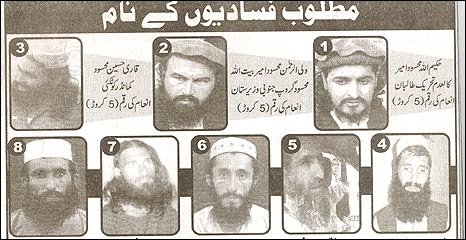|
|
|
Eight South Waziristan Taliban commanders, pictured in a wanted poster: 1. Hakeemullah Mehsud, 2. Waliur Rehman Mehsud, 3. Qari Hussain Mehsud, 4. Azam Tariq, 5. Maulvi Azmatullah, 6. Mufti Noor Wali, 7. Asmatullah Bhittani, 8. Mohammad Anwar Gandapur. |
A top Taliban commander who trains children to become suicide bombers has disproved reports that he was killed during a US Predator airstrike in mid-January.
Qari Hussain Mehsud, a senior lieutenant to Movement of the Taliban in Pakistan leader Hakeemullah Mehsud, spoke to a Pakistani news service on Feb. 14 to take credit for last week’s deadly suicide attacks in Bannu. The dual suicide blasts targeted police in the district and killed 16 people, including Bannu’s police chief and 12 other officers.
“The attacks were carried out to avenge the military operation in Bajaur,” Qari Hussain told Dawn. The Pakistani military claims to have taken control of Taliban-contested regions in Bajaur, the northernmost tribal area that serves as a hub of al Qaeda and Taliban activity in northwestern Pakistan and northeastern Afghanistan.
The Pakistani government claimed Qari Hussain was killed in the Jan. 14 US airstrike that targeted Hakeemullah in North Waziristan. But Qari Hussain confirmed he was alive when he contacted a Pakistani television station on Feb. 1 to deny that Hakeemullah was killed.
Still, Rehman Malik, Pakistan’s Interior Minister, has twice claimed that Qari Hussain was killed, once on Feb. 3, and again on Feb. 10.
Malik has also insisted that Hakeemullah was killed after three conflicting reports of his death surfaced since Jan. 14. Taliban leaders, including the commander who has been reported to have replaced him, have denied the reports [see LWJ report, “Hakeemullah alive, will release tape: Taliban commander“].
Background on Qari Hussain Mehsud
Based out of South Waziristan, Qari Hussain has been a close ally of al Qaeda. Prior to the Pakistani Army offensive in South Waziristan in October 2009, he ran camps in South Waziristan that train children to become suicide bombers. Children as young as seven years old were indoctrinated to wage jihad in Pakistan and Afghanistan, a video taken at one of his camps in Spinkai showed.
The Pakistani military first demolished Qari Hussain’s suicide nursery during a short offensive against the Taliban in Spinkai in January 2008. The military launched a short operation after Taliban forces commanded by Baitullah Mehsud overran two military outposts and conducted attacks against other forts and military convoys in the tribal agency.
The military seized numerous documents and training materials in the demolished camp. In May 2009, a senior Pakistani general described the previous camp as a suicide “factory” for children.
The Pakistani military reported that Qari Hussain was killed in January 2008, based on intercepted Taliban communications. The military later reiterated that claim during a tour of the Spinkai camp on May 18, 2008.
Five days after the military’s second claim of his death, Qari Hussain mocked the military during a press conference held at a government school building in South Waziristan. “I am alive, don’t you see me?” Qari Hussain taunted.
Qari Hussain rebuilt his child training camps in South Waziristan sometime in the spring or summer of 2008.
Qari Hussain is considered to be a potential successor to Hakeemullah.








